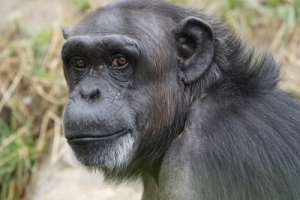Alcohol Consumption by Wild Chimpanzees and the Evolution of Human Habits
A study conducted on wild chimpanzees in Uganda and Ivory Coast has brought new evidence about the natural ingestion of ethanol by non-human primates.
The work engages with the so-called "drunken monkey hypothesis," which suggests that primates' attraction to fermented fruits may have favored, over evolution, metabolic tolerance to ethanol. This adaptation indicates a long history of dietary exposure to alcohol when a common ancestor of humans and other primates developed a variant of the ADH4 enzyme (alcohol dehydrogenase 4), responsible for metabolizing ethanol more efficiently.
Laboratory analyses of the fruit pulps consumed by the animals showed ethanol concentrations of approximately 0.32%. This consumption confirms that exposure to ethanol through diet is not exclusive to humans.
The Daily Alcohol Dose of Chimpanzees
Chimpanzees are heavy fruit consumers. It is estimated that they ingest an average of about 4.5 kilograms of fruit per day. By combining fruit consumption with the average alcohol concentration, researchers calculated the daily ethanol intake by chimpanzees, finding that a chimpanzee consumes about 14 grams of pure ethanol per day (ranging from 13.6 to 15.0 grams/day for males and females in both locations). However, the impact of this dose must be assessed relative to the animal’s body size. Since chimpanzees are significantly smaller than humans, the daily ethanol dose ingested by the primates is equivalent to a 70 kg human consuming about 2.2 to 2.6 standard alcoholic drinks per day.
It is important to note that the article points out limitations that may influence the accuracy of ethanol intake estimates in wild chimpanzees. Researchers used different assay techniques at each field station, making direct comparison of ethanol concentration data difficult, and the daily dosage estimates were based on body mass and diet data from previous studies rather than continuous and detailed observations of the animals studied.
Evolutionary Implications
These findings reinforce that ethanol ingestion from natural sources has accompanied the evolutionary trajectory of the human species long before the domestication of cereals and the deliberate production of alcoholic beverages. Furthermore, they help contextualize the long-lasting and complex relationship between primates and alcohol consumption, contributing to the understanding of both vulnerability and persistence in the use of fermented substances in modern human societies.
References:
- Maro, A., Sandel, A. A., Blaiore, B. Z. A., Wittig, R. M., Mitani, J. C., & Dudley, R. (2025). Ethanol ingestion via frugivory in wild chimpanzees. Science advances, 11(38), eadw1665. https://doi.org/10.1126/sciadv.adw1665


